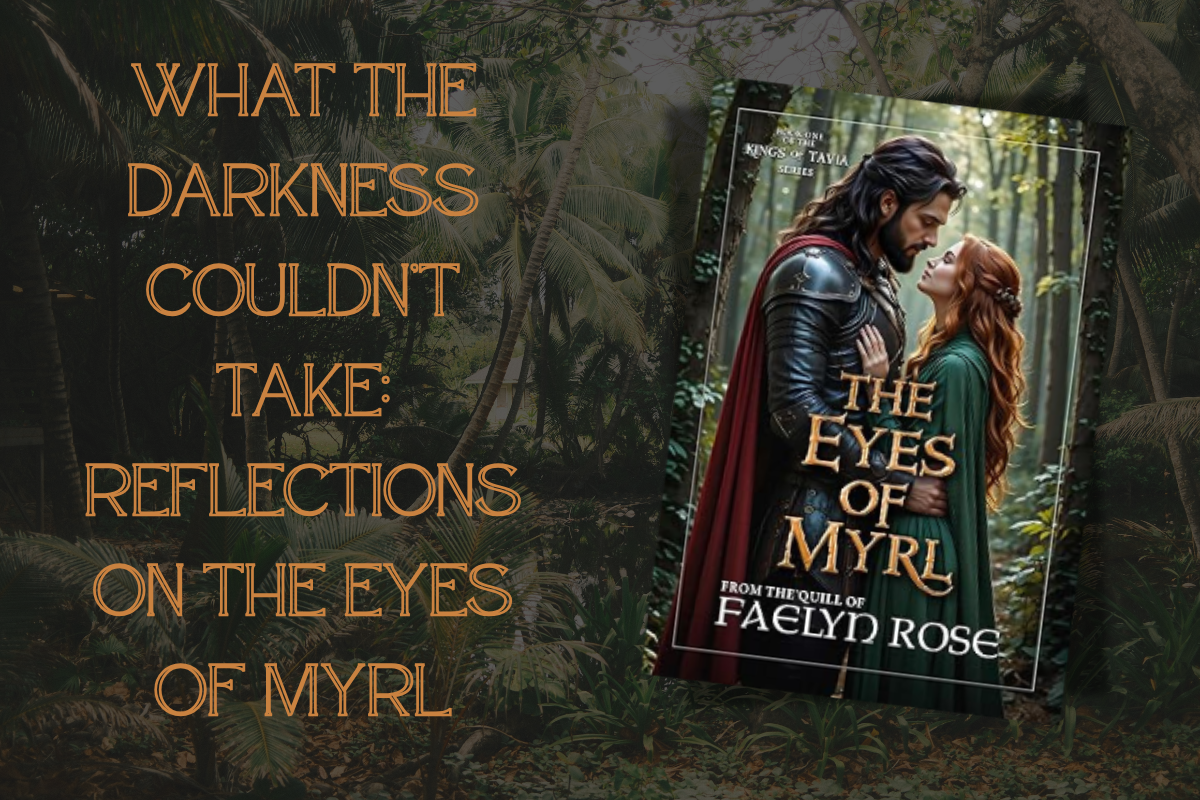The first time Jestaen hides under the floorboards, holding her breath as her village burns, you feel the weight of a world that has failed to protect its daughters. It is not just war that rages outside her hiding place—it is betrayal, silence, and the cold efficiency of men who use women as bargaining chips in political games they did not ask to play. But The Eyes of Myrl doesn’t stop at depicting that trauma. It lingers in the aftermath, in the ache of survival, in the question that echoes long after the flames: What now?
Faelyn Rose’s book is like a tapestry woven from torn flags and sacred treasures. At the center of the story is Jestaen, a young woman from a noble family who is an orphan, hidden, and finally revealed. Warlords and kings fight over her body like it’s a prize in a vicious chess game, but Rose never lets the story settle into victimhood. Jestaen is not just strong; she is also aware, changing, and not going to let the roles that other people have given her take over her life.
One of the most poignant threads in the story is the quiet presence of motherhood—not just biological but spiritual and emotional. Tav, the Moon Goddess who once shaped the land of Tavia for her daughter, feels ever distant yet somehow watching. Her story, buried under layers of violence and conquest, mirrors Jestaen’s own. The connection between divine motherhood and human womanhood simmers beneath the surface, hinting at the possibility that faith—long buried—might still bloom in the ashes of cruelty.
And there is cruelty. The novel does not flinch from it. The Krigans’ raid, King Zarek’s icy tyranny, and the calculated abuse of power—all of it lands with an uncomfortable realism. Yet Rose is not interested in exploiting suffering for drama. Instead, she slows down in the aftermath: the trembling hands, the loaded silences, the instinct to protect before trusting. These moments carry emotional weight not through melodrama but through restraint.
That’s what makes the growing relationship between Jestaen and Rork Konal so affecting. Rork, a prince born to war, is hardened by violence yet not hollowed out by it. He is fiercely loyal, sometimes frighteningly so, but his loyalty is tested by his growing respect—and, eventually, tenderness—for the woman his father sees as a tool. What begins as a tactical rescue becomes a kind of reckoning. Not romance in the commercial sense, but a gradual peeling away of fear. In Rork’s reluctant gentleness and Jestaen’s refusal to shrink, there is something profound about how two people carry pain differently yet meet in understanding.
The emotional impact of the novel lies in those in-between spaces: the half-lit caves, the stolen glances, the internal prayers whispered to gods who may or may not be listening. Rose has an ear for silence, for what goes unspoken when trauma builds its own language. In this way, The Eyes of Myrl is not just about surviving trauma—it’s about the cost of healing and how often that cost is paid in solitude.
Even though the book is set in a fantastical universe, it feels very real in today’s environment. Using women’s bodies as weapons in power battles, getting rid of female gods in patriarchal systems, and the pain of being silenced or forgotten—these are not things that happened in the past. They are urgent truths. Jestaen’s quest for independence isn’t just hers; it’s the same story as many other women who have had to start over after being thrown away.
There’s a striking moment near the book’s midpoint where Jestaen, stripped of rank and freedom, is asked to kneel before her captors. Her decision not to—despite the danger—lands not as defiance for defiance’s sake but as a small reclamation of self. It reminded me how justice often begins in those moments: not in courts or proclamations, but in a quiet refusal to surrender one’s name, one’s body, one’s truth.
The Eyes of Myrl does not offer clean resolutions. Faith doesn’t miraculously save anyone. Justice is murky. Healing is nonlinear. And yet, hope flickers through the story like a hearth fire left burning through a bitter night. That hope is not naïve—it’s earned. It lives in the way Jestaen learns to trust her own instincts, in the way Rork begins to question the legacy of his lineage, and in the suggestion that peace may come not through conquest but through radical mercy.
As a reader, I was left thinking not just about gods and kingdoms but about the everyday courage it takes to live through what was meant to destroy you. Faelyn Rose has given us a story of scarred resilience, and in today’s fractured world, that may be the most relevant kind of magic there is.
